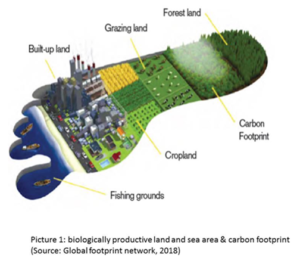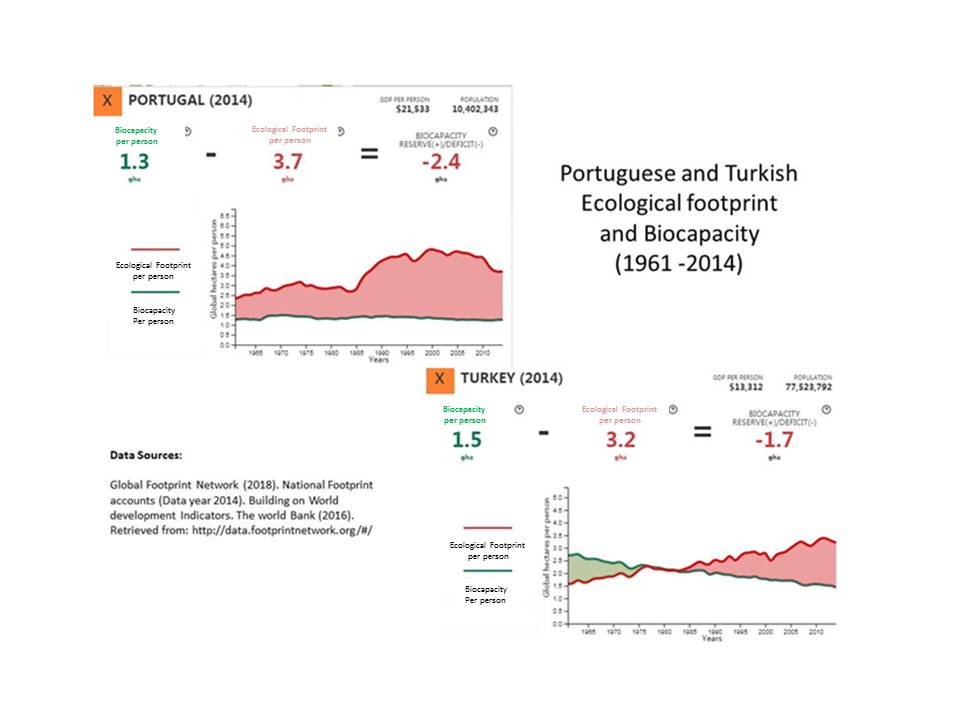The Earth has been changing throughout the times but it is not going on the right track. Actually, are the latest catastrophes marks of humans’ activities on Earth? Is it our fault? Or is the Earth facing natural changes?
Although a few keep defending it is a cyclical event, more and more researchers state the environment has been affected by our lifestyle.
We are using more resources than nature can regenerate – Built up land, Cropland and Grazing fields, Forests, Fishing grounds – and releasing more carbon dioxide than forests can sequester (Global Footprint Network, 2018; Zero, 2017).
Moreover our choices do make a difference. Our daily activities make an impact / a footprint on the planet.
The Ecological Footprint measures this impact, namely the resources to produce the goods and the services to support our lifestyle, as well as the ecological assets needed to absorb our wastes (Environmental Professionals Network, 2017; Global Footprint Network, 2018) – picture 1.
Some countries, like Portugal and Turkey, have been trying to reduce their Ecological Footprint but they are still showing a negative biocapacity reserve: their footprint exceeds the biocapacity of the area available. (Picture 2).

Picture 2 : Portuguese and Turkish Biocapacity reserve
Another relevant feature was provided by Global Footprint Network in 2016: the carbon Footprint makes up 60 percent of the world’s Ecological Footprint, which emphasizes the role of the Green House Gases (GHG) produced through burning fossil fuels for electricity, heating, transportation, for example.
Should common citizens be aware of their Carbon footprint? Researchers believe so!
Students from the Portuguese Caneças secondary school and the Turkish SEV American College got down to work and managed to make some of their families and school staff get involved in the process of measuring their Carbon Footprint.
The Portuguese experience
“ Everything started with a proposal from Ilgın Aydın and Stan Mills – project coordinators from the Turkish SEV American College – to find a way to measure the school and individuals’ Carbon Footprint”, said Lucília Jorge, the Portuguese coordinator.
“It was not easy at first”, added some of the students involved in the process,” we had to get down to work to understand the concepts first and then to find an online calculator suitable for both countries.” (1)
The project is still in progress but 480 families have been involved. “Our families were confronted for the first time with statistics of their impact, and that was overwhelming!”, said Beatriz, one the students involved, “My mom and I, we have been discussing what to do to reduce our footprint”.
According to the coordinator, the results are in line with Portugal average Carbon Footprint; Yet some families present a big footprint (picture 3).

“We are still measuring the school Carbon Footprint”, she added, “It has been difficult to get the members of our school answer the surveys.”
The results will be present to the community early May, and the students are preparing some leaflets, which include hints to become greener.
The Turkish experience – SEV American College
The Turkish coordinators explained that “at first, we did not have a clear goal and were unsure if we should make this an individual or school project. After some discussion, we decided to try to collect data from individuals.
We thought that our “Prep” students would be the ideal group; they have an ecology unit during the last few weeks of the year. The data could be easily tied in with that unit and be used in many different ways and many comparisons could be made. Once comparisons made, we could then look for possible improvements, even compete for the lowest carbon footprint”.
After several weeks, with little response, the project was opened to 9th and 10th grades, also on a volunteer basis. “Only after we offered the project as extra credit did we get a response, and even then, the response was limited.” is mentioned by Turkish coordinators. “Despite the limited number of response, the data from students is very similar to the Portuguese school. The highest value was 9.52 and our lowest was 4.10. The average for the data collected was 5.82.”
One of the students involved: “At the beginning, it was difficult to understand the steps for calculating our individual data. But, the carbon footprint calculator suggested by the Portuguese school was easy to use and provided instant feedback. We had no trouble inputting data and showing receiving instant feedback.”
A controlled experiment
According to the Turkish coordinators, “By attempting to gather data in two different ways, it seems that the two schools unintentionally did a controlled experiment. The Portuguese school made the data collection a mandatory part of the English class, the Turkish school used volunteer students.
The Portuguese school was able to gather data from many participants. The Turkish school had only limited participation. This begs the question, “Why”? This may be interpreted as “Tragedy of the Commons.” We are selfishly logical. I drove to school this morning in an automobile that produces carbon dioxide. I know that contributes to global warming. But, being logical, I believe that, if I stopped driving, it would do very little to solve the global crisis. So, I keep driving.
The results of our unintentional experiment may reflect how environmental problems may have to be addressed. Governments will have to pass legislation.”
Caneças and SEV College – students’ suggestions
The window to avoid disaster is small but “there is still hope to minimize our impact” many students say “There are a lot of things we can and should do every single day. They must seem like nothing but, if everyone tries to help, insignificant or small things can make a difference!”
“Follow the 3Rs policy; drive less, walk or ride your bike; use green energies; turn off lights when not needed; unplug your devices; use less hot water; eat locally-produced and seasonal food; avoid excessive packaging products; plant a tree” are some of their suggestions.
Globally students agree that reducing humans’ footprint is getting more and more challenging. However, raising awareness can make a difference.
- (1) The online calculator can be found at https://calculator.carbonfootprint.com/calculator.aspx




You must be logged in to post a comment.